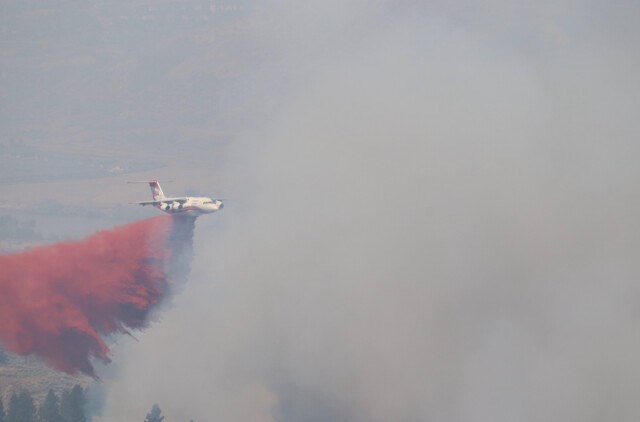The Canadian government is moving to stage more than 350 soldiers and tactical airlift capabilities out of Edmonton to support firefighters battling more than 130 active wildfires in British Columbia.
A forward operating base will house two Chinook medium-lift helicopters, one Hercules transport aircraft, and three Griffin utility helicopters already at a Canadian Forces base in the Alberta capital.
The aircraft will provide tactical airlift capabilities to move firefighters and equipment in and out of fires across B.C., while the soldiers will be made ready to support ground crews as necessary.
“If more are needed, we will move additional support as necessary,” says Defence Minister Harjit Sajjan.
Sajjan says emergency response officials and the military had already trained to respond to flooding or wildfire during the pandemic.
“We have already rehearsed this. This is what we’re executing now,” he says.
The BC Wildfire Service says there are roughly 3,000 firefighters battling blazes across the province, including fires that tore through the town of Lytton, nearly wiping it off the map and scattering its residents.
Carla Qualtrough, Minister of Employment, Workforce Development and Disability Inclusion, said Ottawa has moved to open an E-Service Canada phone line to help people re-issue lost documents and get access to fast-tracked EI benefits.
“This week has been a very harsh reminder that even as we fight climate change we must also adapt to it,” says Jonathan Wilkinson, Minister of Environment and Climate Change.
Meteorologists at Environment Canada are "working around the clock," to provide dispersion predictions, and local wind and air quality forecasts. Parks Canada staff is also moving to help in the wildfire response, the fourth time in the past decade, said the minister.
The federal response comes after a record-breaking heat wave paralyzed huge swaths of British Columbia and overwhelmed many emergency services with temperatures soaring well above 40 degrees Celsius.
In Vancouver, firefighters described "the busiest 48 hours we’ve had on record," with ambulance wait times climbing to 11 hours in some cases. The BC Coroners Service said Friday the heat has likely contributed to at least 719 deaths this week.
Minister of Public Safety and Emergency Preparedness Bill Blair defended the federal government’s role in mitigating the effects of the heat wave.
"There is really close coordination between ourselves and the B.C. government," says Blair.
"We know temperatures will be elevated in the coming weeks."



